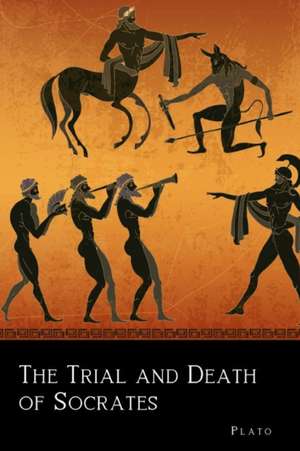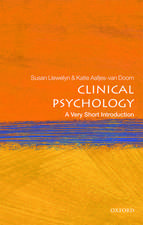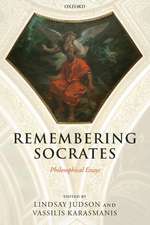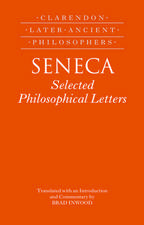The Trial and Death of Socrates
Autor Platoen Limba Engleză Paperback – 16 aug 2019
Despite growing up in Greece's "Golden Age" of liberalism and democracy, Socrates was not a democrat. Influencing young men with his idea that people needed direction from wise men rather than self-government, was likely perceived as a threat to the cherished Athenian republic. Socrates likened himself to a gadfly stinging the "lazy horse" of Athens and did this with zeal, believing his God-assigned purpose was to expose false wisdom as ignorance. Awareness of one's ignorance was a key first step towards true wisdom or virtue, he declared, emphasising that although he, too, was ignorant, he knew it. And that, he argued, was the reason the oracle of Delphi proclaimed "there was no man wiser than Socrates". Little wonder, then, that egos were pricked and enemies made.
Socrates did not record any of his work, and it was left to some of his young disciples - Plato, being the most famous - to give an account of their master's dialogues with Athenians from all walks of life. The Trial and Death of Socrates is a collection of four such dialogues - Euthyphron, Apology, Crito and Phaedo - covering the period from just before Socrates' trial through his last few days in prison, to his courageous death. The reader makes contact with the Socratic method of debate known as elenchus - an unwavering and incisive form of cross-examination that involved a series of questions and answers. For Socrates, definitions and rational, syllogistic argument were key tools in discussing and dissecting subjects such as piety, virtue, the immortality of the soul and the difference between right and wrong.
A misfit in his time, Socrates was arguably the world's first martyr for free speech, and one that passed on an enduring legacy of questioning societal norms.
| Toate formatele și edițiile | Preț | Express |
|---|---|---|
| Paperback (13) | 33.01 lei 3-5 săpt. | |
| Dover Publications – 31 ian 1992 | 33.01 lei 3-5 săpt. | |
| Hackett Publishing Company – 30 noi 2000 | 58.17 lei 3-5 săpt. | +7.72 lei 6-12 zile |
| – | 62.35 lei 3-5 săpt. | |
| www.bnpublishing.com – 6 mar 2012 | 78.92 lei 3-5 săpt. | |
| CREATESPACE – | 164.03 lei 3-5 săpt. | |
| AZILOTH BOOKS – 6 noi 2016 | 65.15 lei 6-8 săpt. | |
| Lulu.Com – 16 aug 2019 | 72.98 lei 6-8 săpt. | |
| Lulu.Com – 14 aug 2020 | 74.73 lei 6-8 săpt. | |
| Bibliotech Press – 31 aug 2011 | 80.76 lei 6-8 săpt. | |
| Lulu.Com – 29 aug 2017 | 102.20 lei 6-8 săpt. | |
| Indoeuropeanpublishing.com – 30 iun 2009 | 105.03 lei 6-8 săpt. | |
| Bibliotech Press – 17 iul 2018 | 120.54 lei 6-8 săpt. | |
| Kessinger Publishing – 10 dec 2008 | 260.73 lei 38-45 zile | |
| Hardback (5) | 166.71 lei 6-8 săpt. | |
| Hackett Publishing Company – dec 2000 | 173.19 lei 3-5 săpt. | |
| Lulu.Com – 14 aug 2020 | 166.71 lei 6-8 săpt. | |
| Lulu.Com – 28 aug 2017 | 185.17 lei 6-8 săpt. | |
| Lulu.Com – 16 aug 2019 | 208.71 lei 6-8 săpt. | |
| Bibliotech Press – 17 iul 2018 | 209.50 lei 6-8 săpt. |
Preț: 72.98 lei
Nou
Puncte Express: 109
Preț estimativ în valută:
13.97€ • 14.56$ • 11.61£
13.97€ • 14.56$ • 11.61£
Carte tipărită la comandă
Livrare economică 21 martie-04 aprilie
Preluare comenzi: 021 569.72.76
Specificații
ISBN-13: 9780359861088
ISBN-10: 0359861083
Pagini: 122
Dimensiuni: 152 x 229 x 8 mm
Greutate: 0.19 kg
Editura: Lulu.Com
ISBN-10: 0359861083
Pagini: 122
Dimensiuni: 152 x 229 x 8 mm
Greutate: 0.19 kg
Editura: Lulu.Com
Descriere
Descriere de la o altă ediție sau format:
Among the most important and influential philosophical works in Western thought: "Euthyphro, " exploring the concepts and aims of piety and religion; "Apology, " a defense of the integrity of Socrates' teachings; "Crito, " exploring Socrates' refusal to flee his death sentence; and "Phaedo, " in which Socrates embraces death and discusses the immortality of the soul.
Among the most important and influential philosophical works in Western thought: "Euthyphro, " exploring the concepts and aims of piety and religion; "Apology, " a defense of the integrity of Socrates' teachings; "Crito, " exploring Socrates' refusal to flee his death sentence; and "Phaedo, " in which Socrates embraces death and discusses the immortality of the soul.
Notă biografică
Plato was an ancient Greek philosopher born in Athens during the Classical period in Ancient Greece. In Athens, Plato founded the Academy, a philosophical school where he taught the philosophical doctrines that would later become known as Platonism. Plato (or Platon) was a pen name derived, apparently, from the nickname given to him by his wrestling coach - allegedly a reference to his physical broadness. According to Alexander of Miletus quoted by Diogenes of Sinope his actual name was Aristocles, son of Ariston, of the deme Collytus (Collytus being a district of Athens).Plato was an innovator of the written dialogue and dialectic forms in philosophy. He raised problems for what later became all the major areas of both theoretical philosophy and practical philosophy. His most famous contribution is the Theory of forms, which has been interpreted as advancing a solution to what is now known as the problem of universals. He is also the namesake of Platonic love and the Platonic solids.His own most decisive philosophical influences are usually thought to have been, along with Socrates, the pre-Socratics Pythagoras, Heraclitus, and Parmenides, although few of his predecessors' works remain extant and much of what we know about these figures today derives from Plato himself.[a]Along with his teacher, Socrates, and his student, Aristotle, Plato is a central figure in the history of philosophy.[b] Unlike the work of nearly all of his contemporaries, Plato's entire body of work is believed to have survived intact for over 2,400 years.[6] Although their popularity has fluctuated, Plato's works have consistently been read and studied. Through Neoplatonism Plato also greatly influenced both Christian and Islamic philosophy (through e.g. Al-Farabi). In modern times, Alfred North Whitehead famously said: "the safest general characterization of the European philosophical tradition is that it consists of a series of footnotes to Plato.























